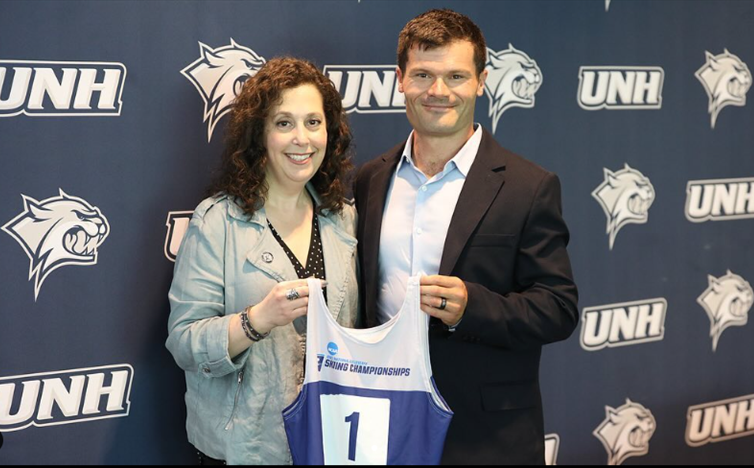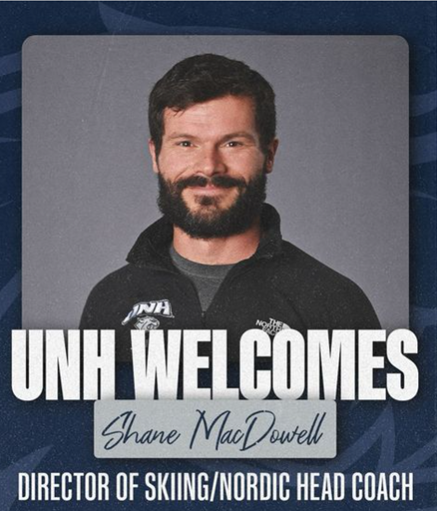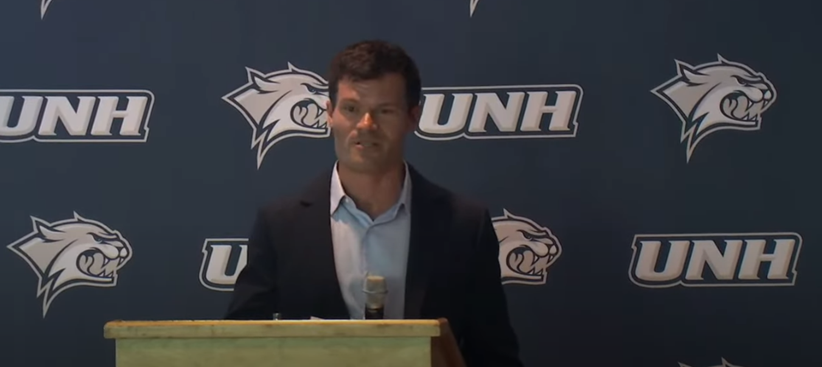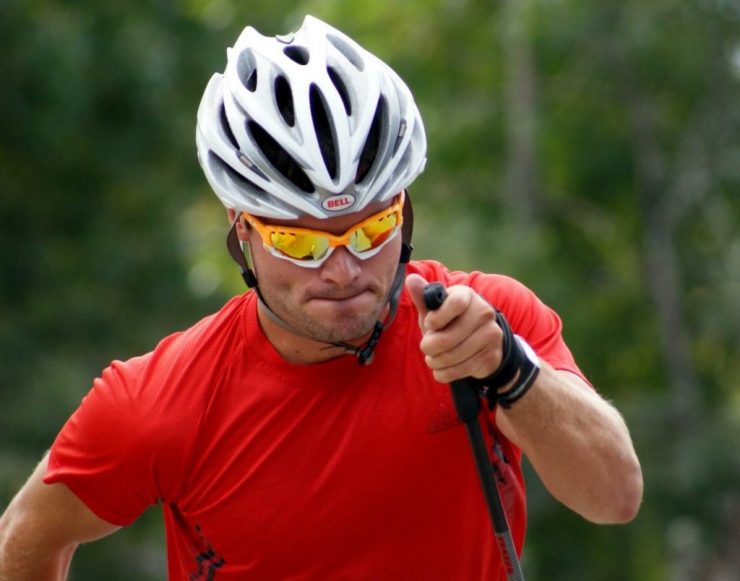
Last May, FasterSkier wrote about the retirement of University of New Hampshire’s (UNH) legendary ski coach Cory Schwartz, who had been with the University for 42 years. This summer, UNH named Shane MacDowell— the team’s former assistant coach— as Schwartz’s replacement. Following in the footsteps of a person whose career stretches back to the Reagan administration is a daunting task. Doing so at a university which has a dedicated and passionate alumni base is even more of a challenge. Shane MacDowell was generous enough to take time to speak with FasterSkier about taking on the challenge of following the career of a legend, and the difficulties involved in coaching a high profile ski program.
This interview has been edited for brevity and clarity.
FasterSkier: First off, congratulations are still in order. You’re still kind of in the early honeymoon phases?
Shane MacDowell: Thanks. Yeah, summer was kind of the perfect time for this to happen. So, it’s kind of easing into it before the chaos begins.
FasterSkier: Shane, where do you call home?
Shane MacDowell: The past three years my family and I’ve been back and forth between Lake Placid, NY and New Hampshire. But now we’re going to be living in Somersworth, New Hampshire.

FasterSkier: Let’s start with one of the harder questions right off the bat. You’re obviously following in the footsteps of Cory Schwartz, who was at UNH for over four decades, and that has to be a challenge— following in the footsteps of a person who has become pretty much an institution. So how are you approaching that aspect of it, if you’re even considering that aspect of it?
Shane MacDowell: Yes, I’m considering that aspect of it. I’m definitely trying to be my own person, and my own coach, with that thought, I feel as though I’ve had an incredible experience running up to this point. Right out of college I worked for Boulder Nordic Sport with Roger Knight and that set me up on the waxing side of things. From there I worked at Green Mountain Valley School and then at Northern Michigan University (NMU) which gave me some really unique perspectives on coaching and leading a program, especially with Northern Michigan under Sten Fjeldheim. I got to really see what a top tier program is like, and then obviously working with Cory (Schwartz). Like you said, he’s an institution, and I had the pleasure and ability to ski for him when I was in college and then to come back and to be able to work with him and see how things work on the other side from being an athlete. I think that helped. It really set me up to be in this position because at UNH it’s not just about being a coach. We do a significant amount of fundraising, and our alumni outreach and alumni engagement are a huge part, which is great. I think what makes the entire ski program unique is because all the alumni are so engaged with the current team and how the program is doing. They want to give back and they want to still be a part of the program. Following in Cory’s footsteps is my goal, and not disrupting the foundation that he has laid, but also adding my own layer to it or my own character to it by doing things just a little bit differently. I think if somebody would come into this program after everything Cory has done to make it what it is — saving it on several occasions—and then to change everything about it, would be making a massive mistake.

FasterSkier: Whenever there’s a coaching change in any collegiate sport program after a long term coach has left, there are inevitable comparisons which get made and you’re going to face that as well. Is that something you’re prepared for?
Shane MacDowell: I think I’m prepared for it, and I think it makes it a little bit easier in that transition because it’s not like I’m coming from the outside as a new hire. This will be my 4th year coaching with UNH. I wouldn’t say it’s as stark as like, a Division One football program coach coming in from a whole different program and those comparisons being made … I’ve been part of the program.
FasterSkier: So you think having been an assistant coach at UNH for the last three years, is going to make the transition easier for you?
Shane MacDowell: I think that makes it a little bit easier. There’s obviously a lot more things that I need to take on, with being a program director as well, that it’s going to take me a little while to get up to speed on. Cory did an amazing job of that alumni outreach that I spoke of before. And, getting up to speed on that and keeping that engagement going is definitely going to be one of the biggest … I hesitate to say hurdles to overcome, but it’s a big step to add on to, trying to run the Nordic program and oversee Alpine as well. So yes, on some of it, it is going to make it easier to transition, but there’s definitely going to be challenges along the way as well.

FasterSkier: Let me follow up with that. Your official title is director of Skiing and Head Nordic coach, which is the same title that Cory had. That includes directing and supervising downhill as well. Do you feel that position holds or creates any tension between the downhill and cross- country programs, especially when you have the head coach whose background predominantly is cross country?
Shane MacDowell: I don’t think it creates tension. There are a couple of other programs around the country that do it the same way and in certain cases, the Alpine coach is the director of the Nordic program. When Cory was in the position, or when I’m in the position, it’s not like we’re telling the Alpine program what they can or can’t do or how they should be training or anything like that. We’re one team that is headed by the director of the program. We’re not looked at as Alpine and Nordic. So to have one person, whether it be the Alpine head coach, or the Nordic head coach be the lead on that, I think it’s beneficial. Because I think when you separate the two, we would start competing for fundraising dollars within our alumni base and this way, when it’s looked at as one program, we’re doing it all as one unit.
FasterSkier: In your position, will you actually be involved in coaching the Alpine athletes at all or working with them in any capacity?
Shane MacDowell: Coaching No. I won’t be on the hill coaching them, going through gates, that’s what Brian Blank and Parker Costa are doing. Interacting, yes. I said we’re one team, so we certainly interact as a team. Our Alpine and Nordic are very close with one another. Sometimes we’ll have training sessions together for dry-land, usually like our more explosive workouts, doing plyometrics, or sometimes we’ll get a speedball game going. I’m not sure if you know what speedball is?

FasterSkier: I don’t.
Shane MacDowell: It’s kind of a combination of two hand touch football and soccer. But you know we have those engagements where we get the two teams together and it keeps the team close and reminds them that we are in this together. It’s not just one team or the other. So, in that regard, I hesitate to call it coaching, but definitely coordinating to get together and keep that initiative going that we are one team working towards the same goal.
FasterSkier: In your remarks at your introductory press conference, you mentioned the time you spent at NMU (Northern Michigan University) under Sten Fjeldheim— who I think it’s fair to say is another legendary coach. You’re in a unique position where you’ve worked under both of these legends. Can you expound a little bit on what coaching lessons you learned from Sten and maybe if you can make a comparison of Sten’s methods versus Cory’s?
Shane MacDowell: I strongly believe that when I went and worked with Sten at Northern Michigan, I very much went to school with him on training methods, and technique. Sten is a technician when it comes to all of that, and I had the opportunity to work with him, who I think was probably one of the most successful coaches that the U.S. has ever had— so many national champions and some pretty incredible teams. Let me go on with Cory before I kind of compare the two. With Cory I had the background of the training and being able to write plans and have confidence in it and evaluate technique when I came to UNH. But with Cory I think I learned— and this isn’t to say I wasn’t learning it under Sten either—I learned how to find my coaching style a little bit more, work on the coach-athlete interaction, a little bit more patient scenarios and how to approach certain situations. And then also the other aspect of the program too is with fundraising, and I keep coming back to that which for our program is just huge. They have two pretty distinctly different styles, but I think it’s by necessity of the program. With UNH, fundraising and alumni engagement is huge for us because it has to be. Fundraising and alumni engagement was present at Northern Michigan, but it wasn’t as much of a must, so you could certainly focus a lot more time on the training aspect of things.
FasterSkier: I think it might be fair to say that NMU might have a little higher name recognition when it comes to attracting international athletes? Is that something that played into how the coaches handled athletes or affected the coaching at all?
Shane MacDowell: It’s actually kind of funny because it surprised me when I was working for Sten that his first international athlete wasn’t until when I was actually skiing in school in 2005, 2006. Up until then, he had only had Americans. And even when I was working with him, we had a couple of foreign athletes, but I would say the majority of the team was all Americans. My first year there, we had the best men’s team in the country at the NCAAs and they’re all from the Midwest which is pretty unique. You can’t take anything away from Sten and Northern on how successful they were. But to compare the Northern program to the UNH program or any program that has an Alpine team as well is like comparing apples and oranges. Because when you have an Alpine team as well, all of a sudden, your scholarships get cut in half for both programs. You’re allowed to have X number of scholarships, but then that gets split between Alpine and Nordic. With Northern they’re allowed the same number of scholarships, but it’s only for Nordic, so the power of having that many more scholarships just on the Nordic side, might play into being able to entice that foreign talent a little bit more.
FasterSkier: NMU has an Alpine program but it’s a separate entity, right?
Shane MacDowell: Yeah, it’s a club team, so they don’t even compete in the same league.
FasterSkier: Working with Sten, can you put your finger on one or two major takeaway coaching lessons that you learned from him?

Shane MacDowell: The biggest takeaway from him was writing a training plan; writing one that can help the athletes be successful and improve throughout their time on the team. He was just incredible at knowing what an athlete needed and prescribing the right training and holding them to it and making them accountable. So, I would say, a combination of knowing training, but then also having that ability to get the respect from the athletes because they know that you know what you’re talking about and holding them accountable to get that work in to reach their best potential. And then the second is probably his ability to analyze technique and really hone in on where an athlete’s deficiencies are and being able to relay that in a way that the athlete understands is probably another big take away.
FasterSkier: Moving back to something else that you were talking about earlier regarding the importance of alumni outreach. UNH’s Nordic fan base is different than it is at a lot of other schools—it’s more involved. The importance of fundraising is high on the list of things that you have to do. As the head coach having to be involved with the fundraising, the training of athletes, and the administration of the program … it’s a lot for one person. What’s your strategy for tackling all that, because it seems like it’s just so much?
Shane MacDowell: It’s not really just all on one person. For the Nordic program we just hired a new assistant coach to replace myself with Brandon Herhusky, who was the assistant at UVM the past few years. So, it’s not all just falling on me. As mentioned before, we’re working as one team so we’re not engaging just the Nordic program, we’re engaging all of our alumni. Having our Alpine staff there to assist with that and help our program to have even greater outreach is great because then all of that responsibility isn’t necessarily just falling on one person’s shoulders.
FasterSkier: When you were an assistant at UNH, were you able to kind of sit back and watch how Cory processed and worked with the alumni and alumni relationships and saw how he managed it?
Shane MacDowell: Yes, and I think that’s been one of the biggest advantages of stepping into this role. I’ve had that experience of being able to see how Cory engaged with the alumni not only through email and social media, but to try to have at least one alumni event a year. During the Carnival season this past year we had it at the Dartmouth Carnival. So, we had as many alumni that wanted to come and had sort of a little banquet style dinner with everybody, and they actually got to come and watch the races as well. So just having that sort of engagement with them, keeping alumni involved as much as possible and up to date with who’s on the team, what the team’s doing— their successes both on the ski trails and in the classroom goes a long way. Our alumni obviously look at the team and their time on the team as being very special and still want to be involved with that and give back in in any way that they can.
FasterSkier: You don’t see it as quite the same daunting task as an outsider does looking in terms of managing all these different aspects of the program. It seems that there is an infrastructure in place, with people, to help manage all that?
Shane MacDowell: There’s definitely the infrastructure in place and like I mentioned earlier, Cory did an amazing job of laying that foundation. I would be sorely mistaken, if I were to say I’m not going to screw this up a little bit at one point or another. There’s going to be growing pains for me because it is new, but there are those other aspects to the program that help you tackle all the tasks that we do have.
Please revisit FasterSkier for part II of our interview with Shane MacDowell.



